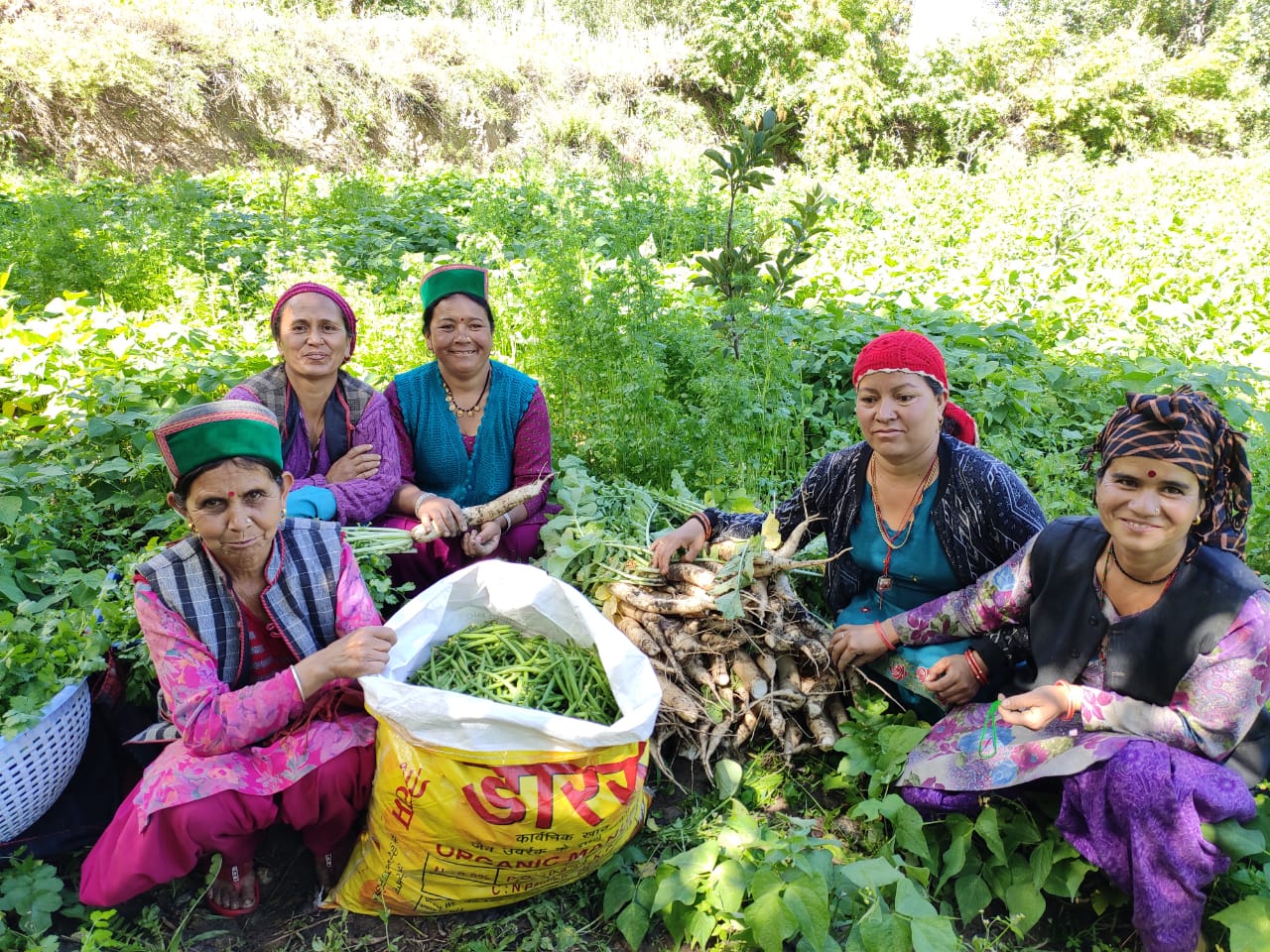Women have been tirelessly and silently contributing to agriculture and horticulture in this North-Western Himalayan state of Himachal Pradesh, which is primarily a rural state. They comprise nearly half of the population of the state and play a pivotal role in crop and fruit production activities, right from sowing to harvesting, post-harvest management and dairy management.
Yet the women farmers have been recognized minimally for their work and not much-targeted efforts have been put forth for their capacity building for overall social inclusion.
Advertisement
The Prakritik Kheti Khushhal Kisan Yojana (PK3Y), which was launched by the Government of Himachal Pradesh in 2018 to promote the non-chemical, low-cost and climate-resilient Zero Budget Natural Farming (ZBNF) technique (propounded by Padma Shri awardee Subhash Palekar from Maharashtra) for sustainable agriculture, is one such initiative which has focused on women farmers as a priority for their economic and social empowerment.
The natural farming technique cuts the dependence of farmers on the external market and is based on farm inputs made from dung and urine of ‘desi cow’. The environment-friendly technique reduces the cultivation cost drastically and increases the net income of farmers and producers is natural- without any chemicals. The scientific studies conducted by the State Project Implementing Unit (SPIU) of PK3Y so far have also validated it and have shown that the natural farming technique has reduced the cost of cultivation up to 46 per cent and has led to an increase of 22 per cent in net returns in Himachal Pradesh. With this technique, the farmers are growing up to 10 crops concurrently, which has led to the principle of sustainable crop intensification as envisioned by FAO of the United Nations and thus contributing to increased crop diversity on their farms.
So far 1,74,394 farmers have been trained in this technique in Himachal Pradesh, out of which 1,71,063 have adopted this practice from partial to fully involving an area of 9421 hectares. Ninety-nine per cent of Panchayats in the state have been covered in the state in PK3Y. Women farmers roughly comprise over 60 per cent of the trained and practising farmers in the entire state.
Over 100 women farmers in the state are designated Natural Farming Trainers now. Several women groups are being formed at village/Panchayat levels, who have adopted natural farming techniques collectively after training. The extension officials working under PK3Y are providing regular handholding, including financial support to these groups for new initiatives. As many as 502 ‘Krishi Sakhis’, designated so under the National Rural Livelihood Programme (NRLM) by the Rural development department, have been trained in natural farming in the entire state for further extension among Self Help Groups (SHGs) of women in villages.
The grouping and capacity building efforts in PK3Y have not only empowered the women farmers with information but have helped them connect with each other. These efforts are shaping up the hitherto silent women workers into leaders in the society and are giving them an opportunity to take up their community concerns other than agriculture also.
Shares Rishu Kumari, 32, from Jamanabad in Kangra district, “My life has changed after I switched to natural farming technique through training in 2019 under PK3Y. I started with a small piece of land and am now doing it on 1.2 Acre. The expenditure on farms has reduced a great deal and our income has increased. My husband, who is a teacher in school, also helps me with the field, but I handle everything now and make the decisions on the farm as we are no more dependent on the market for any input. It is an easier option as I prepare the farm inputs, which are all made from desi cow’s urine, dung, local leaves, besan (gram flour) and gud (jaggery), myself.”
“The produce is a mix of crops, thus nutritious and is chemical-free, so many buyers come to my farm now to purchase vegetables and someplace orders in advance,” she says. Rishu Kumari grows peas, mustard, grams, broccoli, ginger, radish, carrot, wheat and some other crops. She is now a designated Natural Farming Trainer and is entrusted with the responsibility of 3 surrounding panchayats. She is educating not only village women but also men in other 3 surrounding panchayats through lectures and practical training on her farm, which she says has made her so confident in life financially as well as socially for the first time.
For Satya Devi, an apple grower from Lafughati in the Shimla district, natural farming came as a life-saving option. Satya Devi has been managing her 0.4 Acre orchard alone for livelihood. “I would have lost my livelihood, as I had got major health problems due to the chemical sprays I was doing and the doctor told me to stop it. With the natural farming technique, which is cheaper and does not involve chemicals, my health is fine and farm expenditure has gone down. I am satisfied that I am not selling chemical-laden fruits to the consumers now,” she said. Unlettered Satya Devi is also a designated Natural Farming Trainer and her orchard attracts a lot of learners.
This confidence building in the women is working wonders. Like the women group in Peja an interior Chirgaon area of Shimla district, which convincingly shifted to natural farming of Red rice three years back and even got an award of ₹ 10 lakh from the Government of India for cultivating natural Red rice with their traditional seeds. The group has inspired all farmers in the village to take up Red rice cultivation through natural farming.
Once convinced, many women farmers got through with their agenda of natural farming in their fields despite initial opposition at home and have changed the mindsets at home and society by example. This non-chemical natural farming has an important role in providing nutritional security to the family. Women farmers are particularly happy as they can grow multiple crops and vegetables in their kitchen garden with this technique, which has enriched their food platter for the family.
A unique ongoing initiative of host-intern farmers under PK3Y in Himachal Pradesh has also come as an opportunity for women in agriculture. The women farmers, who are hosting female interns, interested in learning natural farming techniques for six months, have proved their worth even more, and so as interns, who are shaping up as future managers and farm entrepreneurs.
The farmers in HP, including women, have developed their own marketing models for natural products and many of them get customers in advance. The state is already working on a mechanism for certification of natural produce and its marketing as a part of the Sustainable Food Systems Platform for Natural Farming (SusPNF) initiative as a next step.
Even as Himachal Pradesh aims to bring all the 9.6 lakh farmer families under the fold of natural farming in a phased manner, it has emerged as a leader in showing the way to the entire country, which is now working out ways for sustainable agriculture practices with overuse of chemical fertilizers and sprays having pushed the farmers to abandon their lands and migrate to urban areas over last some decades.
The states like Gujarat and Haryana are replicating the Himachal model of PK3Y and the concept is widely appreciated by the national and international organisations including NITI Aayog, IFOAM, UN-FAO and Bio-Vision, with whom the tiny state has already drawn linkages.
With natural farming becoming a Government of India initiative for the country now, women farmers of Himachal Pradesh are bound to play a significant role as some Natural Farming Trainers amongst them would be travelling to other states to give hands-on training to the farmers there.
Prof. Rajeshwar S Chandel is Executive Director executing the ambitious ‘Prakritik Kheti Khushhal Kisan Yojna (PK3Y)’, Government of Himachal Pradesh.
Advertisement














